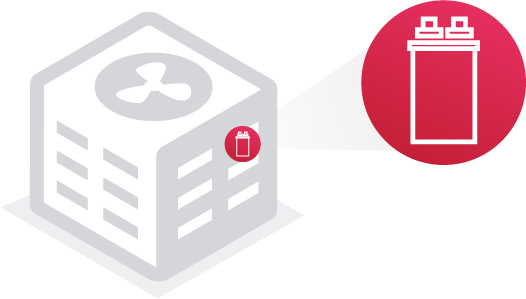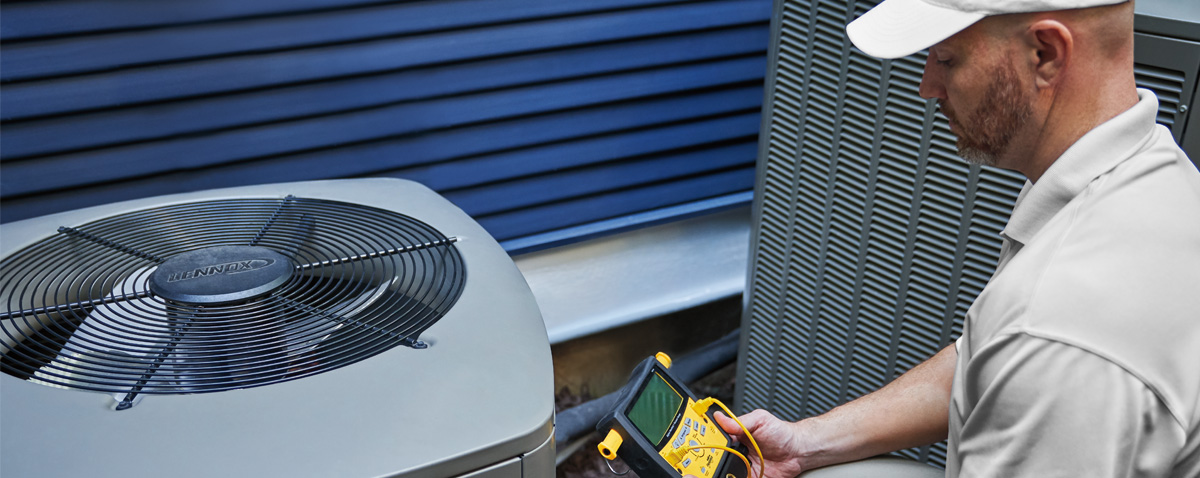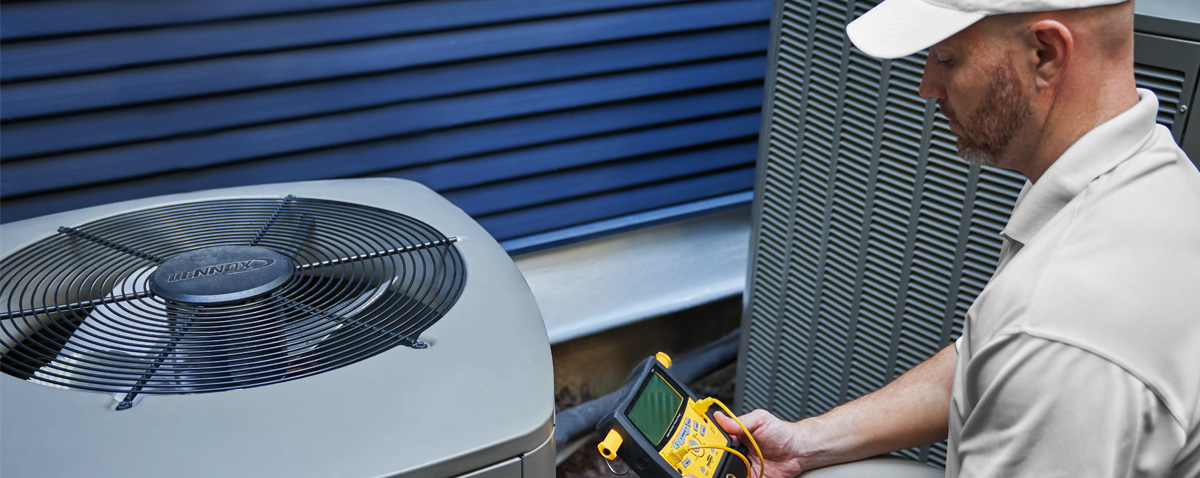Everything you need to know about this vital system component.
Within the jumble of wires, components and connectors behind your air conditioners access panel lives a simple, but vitally important part known as a capacitor. Generally, AC capacitors look like small soda cans with two leads extending from one end. They are one of the most important components in an air conditioner – and the most frequently replaced.
Much like a battery, a capacitor is designed to store energy. However, a capacitor stores its energy for only a short time, accumulating and distributing it as the system it’s installed in requires.

Rolled tightly within each capacitor are two thin, conductive plates. Often aluminum, these plates can be made from just about any material that possesses the necessary properties of conductivity and insulation. Sandwiched between those plates is an additional layer made from an insulative material such as ceramic. When subjected to a charge, the main layers store energy in the form of an electrostatic field, while the insulative layer between allows for the temporary storage of that energy.
What AC Capacitors Do
Capacitors are a component of the power circuit within an air conditioner or heat pump. While they can perform no real task on their own, they provide a necessary assist to other task-oriented electrical components such as motors. Within a unit’s power circuit, capacitors live between the incoming AC power supply and the motor that drives the air conditioning unit. In simple terms, the capacitor’s job is to regulate the flow of that power based on the system’s status and needs.
Acting as a buffer and a booster between the incoming flow of electricity and the components that need it, the capacitor ensures that a constant, even flow of power gets to the motor or other components by constantly accumulating and releasing its stored energy to the system as needed.
Capacitors are also vital in the start-up process, feeding powerful jolts of stored energy to the motor until it’s up to speed. Once everything is running, the capacitor either reduces its own pass-through current or passes the job of buffering off to a second capacitor optimized for keeping the system running.
AC capacitors are measured and rated by voltage and microfarads. Voltage indicates the amount and speed of the electricity that can flow through it. A microfarad is a measurement of the capacity of the capacitor to store electrical current. Most AC capacitors range from 5 MFD (microfarads) to 80 MFD.
Healthy, serviceable capacitors are critical to getting an AC unit started and keeping it running efficiently.
Types of Capacitors
There are two types of capacitors required to operate an AC unit – start capacitors and run capacitors. Depending on the system you have, this combination can take the form of either two separate capacitors, one for each task, or a single dual capacitor capable of handling both.
In two-capacitor systems, the more powerful start capacitor is designed to deliver the jolt the AC’s motor needs to get the cooling cycle started. Once the system is running, the start capacitor’s job is done, and it hands off to the run capacitor, which is more efficient at storing and releasing the smaller, more variable quantities of electricity needed to keep the system humming smoothly.
The more modern, dual capacitor is capable of handling both jobs in a single “soda can.” Equipped with the tools it takes to do both jobs, the dual capacitor is able to adjust once the system is started. The single component design is also convenient and a space saver for your technician if he ever needs to troubleshoot your AC unit.
If one or both of capacitors fails in a two-capacitor air conditioner, your technician may opt to replace both with a single, dual capacitor unit for simplicity and future convenience.
Why Is a Capacitor Necessary?
Air conditioners are high-powered machines that require a lot of energy. They’re constructed of heavy components and designed to work under extreme stresses – none of which your home’s wiring and electrical system are designed to handle.
Enter the humble AC capacitor. With the ability to accumulate and distribute power in bursts, a capacitor can deliver the kickstart your air conditioner needs to get the cooling process going and continue to modulate the power your system needs to run all day.
As simple as they are, making all this happen day in and day out is a tough job. The constant demand put on most AC capacitors, especially those in extreme weather zones, is the reason they fail more often than other components. It’s also one of the most common reasons for air conditioner break down, especially during the heat of the summer.
There are a number of telltale signs that you’re headed toward a capacitor failure – and luckily, replacing a capacitor is a simple, quick service call for your technician.
Signs You Have a Bad AC Capacitor
Generally, an AC capacitor will last around 20 years, but there are a number of factors that can shorten that lifespan. If you’ve noticed performance issues of any kind with your air conditioner, take the time to run your system through its phases and review its performance. There are several observable signs that can indicate a failing AC capacitor. The following is a list of common issues to look for.

Here are a few of the most common -
Your system is making a clicking or humming noise.
There are many issues that can cause your system to make strange sounds. A dying AC capacitor is just one of the possible culprits. In the event you hear clicking or humming coming from your system, we advise you call an HVAC professional to diagnose the issue.
The system has difficulty starting.
Unless it’s right below your bedroom window, when your AC starts and stops a cooling cycle, it should go unnoticed. If you can hear your air conditioner starting or trying to start with each new cooling cycle, you could be on the verge of a capacitor failure. Again, there are other things this could indicate, so consult a professional to diagnose the issue.
You’ve seen a recent increase in your energy bills.
Summer electric bill increases are expected, but if you notice a spike or a gradual increase that doesn’t seem to be slowing, you may have an issue with your AC system. A struggling capacitor can lose its ability to hold a charge, requiring more electricity than usual to keep your AC unit running – thus running up your energy bills.
Your AC is blowing warm air.
The most obvious sign that there’s something wrong is when your system is blowing warm air. A failing capacitor can make it difficult for your AC to keep up. When a system gets behind, it’s unable to reduce the temperature within the home, so without feedback from the thermostat, it just continues trying – and your air handler will continue to blow warm air throughout your home.
You detect a burning smell or see smoke.
This can indicate problems far more serious than just a capacitor. A burning smell can indicate melted or burning wires within a failing motor or another component overcome with heat. This damage can prevent an AC capacitor from working properly, leading to a build-up of electrical energy within a capacitor – and eventually a fire hazard. If this smell doesn’t go away or you see smoke, turn your unit off immediately and call 911 to prevent disaster.
Maintaining the Capacitor in Your System
There are some things that you can do to help avoid an AC capacitor failure.
First and foremost, find a licensed professional in your area who can provide you with regular services and yearly tune-ups. This more than any other practice will do the most to help you get those 20 years out of your AC capacitor.
As an added precaution, you can install an HVAC surge protector. Keep in mind, we are not talking about the office surge protectors we’re all used to. An HVAC surge protector is a high-voltage device that must be installed by an experienced technician. Give your local technician a call to get an install quote today.

Your air conditioner will not operate without a working capacitor. But if you do suspect you have a failing AC capacitor, do not attempt to replace it yourself. AC capacitors are connected to the wiring inside your unit, making injury or further damage to your air conditioner a possibility. In addition, capacitors are high-voltage devices and can carry a residual charge that could seriously hurt you.
If your air conditioner is acting strange, and you think you may have a capacitor issue, call your local Lennox dealer today and get your system checked out by a pro. Replacing a failing AC capacitor now could prevent additional damage to your air conditioner – and even disaster.

